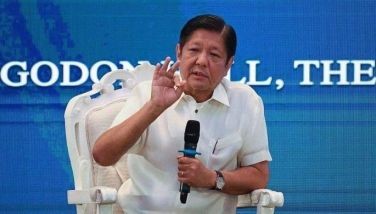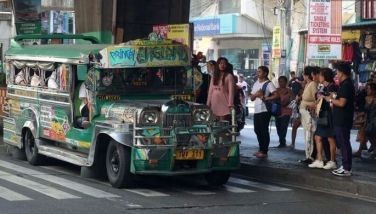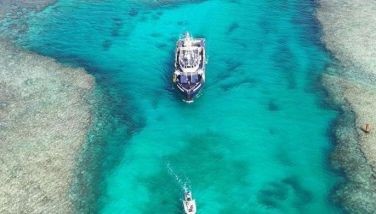YEARENDER: Wildlife conservation, fighting illegal trade mark DENR year
MANILA, Philippines - Wildlife conservation, fighting the illegal wildlife trade and poaching and taking a strong stance on climate change marked the year 2015 for the Department of Environment and Natural Resources (DENR).
In the early part of the year, the DENR’s Biodiversity Management Bureau (BMB) forged an agreement with Dreamland Nature and Adventure Park in Amlan town, Negros Oriental, for it to become a repository of animals rescued and confiscated from wildlife traffickers.
Owned and managed by the municipal government of Amlan, Dreamland attracts tourists and local folk with its nature and wildlife adventures. The 16-hectare park acquired wildlife species, including wild cats from the Middle East and camels from Australia.
BMB director Theresa Mundita Lim and Amlan Mayor Bentham de la Cruz signed the agreement last March.
Lim said the partnership was part of the BMB’s continuing management and improvement of its wildlife rescue centers, which rehabilitate injured, sick and orphaned native wildlife and release healthy animals to their natural habitat.
The BMB has the authority to dispose of some of the animals in its custody through different modes, including partnership with zoos and other animal centers.
“Some of our confiscated protected species cannot be released back to the wild, so one of our options is to turn them over to qualified institutions for co-management,” Lim said.
DENR’s collaboration with the municipal government of Amlan would boost government efforts to educate the public on the importance of preserving wildlife.
Under the agreement, the BMB will “loan” to Dreamland “certain species and quantity of wildlife fauna” from its other wildlife rescue centers. The bureau will also document and monitor Dreamland’s care of the animals and provide the necessary technical assistance.
Dreamland, on the other hand, will assume full responsibility, including shouldering all expenses for the transfer and care of animals.
The facility will also be allowed to acquire additional species from authorized sources, but the loaned animals and their future progeny or offspring will remain as government property.
It was also in March when the DENR issued a directive requiring the use of cleaner fuel and imposing stricter emission standards for all vehicles.
Environment Secretary Ramon Paje said the requirement for cleaner fuel and stricter emission standards was part of government efforts to improve air quality in the country, particularly Metro Manila.
DENR Administrative Order No. 2015-04 issued by Paje provides the new vehicle emission standards to be complied with by new and in-use vehicles. The order also enjoins the Department of Energy to ensure the availability of Euro 4 fuels.
Considered the cleaner fuel, Euro 4 has sulfur content of only 50 parts per million (ppm) for both diesel and gasoline, compared with 500 ppm for Euro 2.
Benzene in Euro 4 gasoline, on the other hand, is only 1 percent by volume compared to 5 percent in Euro 2.
As for aromatics, Euro 4 fuel contains only 35 percent by volume compared to Euro 2 which prescribes no limit.
“Low sulfur fuels will lead to reduced emissions of particulate matter. These particulate matters, along with other pollutants, can penetrate deeply into sensitive parts of the lungs and can worsen existing respiratory and heart diseases,” Paje explained.
The planned shift to Euro 4 was made possible through the support of oil players, car manufacturers and transport groups. ?Since 2009, the Philippines has been implementing the Euro 2 fuel standards.
DENR’s order also provides more stringent emission standards for carbon monoxide (CO), hydrocarbon, oxides of nitrogen and particulate matter to be complied with by new passenger and light- and heavy-duty vehicles.
It also provides that all new vehicles to be used or introduced into the Philippine market by January 2016 shall be equipped with Euro 4 engine and compliant with Euro 4 emission standards.
DENR’s Environmental Management Bureau shall issue Certificates of Conformity only to new vehicles that comply with the Euro 4 emission standards prescribed by the DENR. It is a requirement for initial registration of vehicles with the Land Transportation Office.
The implementation of vehicle emission limits, consistent with Republic Act No. 8749 or the Philippine Clean Air Act of 1999, took effect in July.
Algae in Boracay
At the height of vacation season last May, the DENR conducted an inventory of establishments in Boracay island that have no environmental permits and violate environmental laws and regulations, particularly the Clean Water Act.
The crackdown was triggered by the emergence of excessive green and slimy algae marring Boracay’s shoreline.
Although the water samples indicate that the island remains safe for swimming, Paje said the boom in algae growth still points to water pollution in the area caused by poor waste management with sewage being dumped into the waters.
Resorts and other businesses that do not have their own sewage treatment plants were required to connect to the island’s sewer lines. Violation notices were also sent out to erring establishments.
The appearance of green algae in Boracay has become a natural occurrence during summer months when there is high influx of tourists to the world-famous island.
A study by conservation group Global Coral Reef Alliance said the presence of green algae along Boracay’s shoreline during the calm season is a strong indicator of very high nutrient pollution and they are typically found right around sewage outfalls.
According to the study, the algae die in the rough season because waves dilute nutrients to lower levels and wash away the algae and the suspended sediments reduce the light levels. The algae become visible again in the next calm season.
The study claimed that seasonal blooms are due to the uncontrolled explosion of population in the interior of the island, whose sewage is not connected to the sewage system.
Pamana dies
In August, sad news befell the DENR. Philippine Eagle “Pamana” was shot and killed by unidentified perpetrators.
The three-year-old female Philippine Eagle was found dead by biologists from the Philippine Eagle Foundation (PEF) and forest guards at the Mt. Hamiguitan Range Wildlife Sanctuary in Davao Oriental. A puncture and metal fragment on her right breast indicated she had died of a gunshot wound.
Paje condemned the killing and called on law enforcement units in the province to assist regional environment officials in hunting down the perpetrators.?“We are distressed that, despite intensified awareness campaigns by various stakeholders, some people still have a blatant disregard for our natural heritage, which, sadly, is what Pamana’s name means,” he lamented.
Paje also offered a P100,000 reward for the arrest of those responsible for Pamana’s death.
The Philippine Eagle is protected under Republic Act No. 9147 or the Wildlife Resources Conservation and Protection Act. Anyone found guilty of killing wildlife species can be imprisoned from six to 12 years and fined an amount ranging from P100,000 to P1 million.
Moreover, illegal hunting within the Mt. Hamiguitan Range, which is a protected area, is also punishable by a jail term of six years and a fine of up to P500,000.
Even if Pamana’s death was a setback to the country’s biodiversity conservation program, the government would continue to pursue its breeding program for the raptor through the PEF.
From the critically endangered eagle, the DENR’s focus turned to monkeys after it decided to suspend the issuance of transport permits for these animals pending an investigation on how several captive monkeys in an undisclosed facility in the country were infected with Ebola Reston Virus.
The suspension last September aims to stop the spread of the Ebola virus.
A transport permit is being issued by the DENR, through the BMB, authorizing an individual to bring wildlife from one place to another within the country.
The DENR field offices nationwide were also advised not to issue transport permits until the interagency body tasked to probe the incident gives clearance.
The investigating team composed of representatives from the DENR, Department of Health (DOH) and the Bureau of Animal Industry of the Department of Agriculture is trying to determine the source of the virus and confirm which other living species could possibly have been infected by it.
“While the DOH ensures the safety of humans, we at the DENR also need to ensure that the virus would not threaten the rest of the monkey population nor infect other animal species,” BMB’s Lim said.
The DENR monitors local monkeys as they belong to the breed of Macaca fascicularis or the Philippine macaque, which is classified as “near threatened” in the Red List of Threatened Species of the International Union for the Conservation of Nature.
Capturing and transporting of Philippine macaque are strictly regulated and require government permits.
As to water supply problems being faced by the country because of the current El Niño, Paje urged the public to report cases of unauthorized extraction of water from deep wells, which results in groundwater depletion in Metro Manila and nearby areas.
Concerned officials said its full impact would be felt up to the early months of 2016.
Paje said the crackdown was a “preemptive measure” because the National Water Resources Board (NWRB), which he chairs, anticipates a rise in construction of illegal deep wells as the dry spell is affecting the country.
“Groundwater extraction is strictly prohibited throughout Metro Manila and certain parts of Bulacan and Cavite provinces, and extraction in other areas in the country is regulated by the NWRB,” Paje said.
NWRB coordinates and regulates all water-related activities that have impact on the physical environment and the economy.
Paje instructed all DENR field offices nationwide to be ready to receive inquiries and complaints about illegal deep wells and coordinate with concerned local government units and district offices of the Local Water Utilities Administration for proper action.
Climate conference
In December, the DENR took part in the historic UN climate change conference in Paris, France.
More than 190 countries embarked on two weeks of negotiations to hammer out a new universal climate pact that will specify tracks of finance, mitigation and adaptation actions from 2020 and beyond.
The DENR chief, who was part of the Philippine delegation to the recently concluded climate talks, criticized other countries for failing to include crucial adaptation finance in the current draft of the Paris agreement.
“The Philippine delegation is seriously concerned about the fact that there is not enough provision in the draft Paris agreement that provides adaptation finance for the developing countries most vulnerable to the adverse effects of climate change,” he said.
He pointed out that there was no reference to the amount of finance needed for adaptation in Article 6, which covers the element of finance in the new climate deal.?Paje also said there should be a collective target for adaptation with a “solid quantitative goal,” or a particular amount for adaptation finance that should be reviewed every five years.
He noted that predictable financing sources are critical for the implementation of initiatives like technology transfer and capacity-building innovations to enable the country to adapt effectively to climate change impacts.
He stressed that actions that would limit global warming to below 1.5 degrees Celsius, which now enjoy the support of 112 nations, must be fast-tracked and sustained despite the setback caused by the failure of countries to agree on the review of the 2-degrees Celsius goal.
Such review would have reportedly provided scientific evidence for the necessity of increasing mitigation targets.
The Climate Vulnerable Forum, an advocacy coalition of 43 middle income and developing small-island nations led by the Philippines, has pushed for the continued adoption of the 1.5-degree Celsius goal even after the setback.
Paje noted that it is important for the countries participating in the negotiations to work in solidarity in establishing the loss and damage mechanism, increasing national mitigation actions and accelerating capacity development for adaptation.
- Latest
- Trending
































